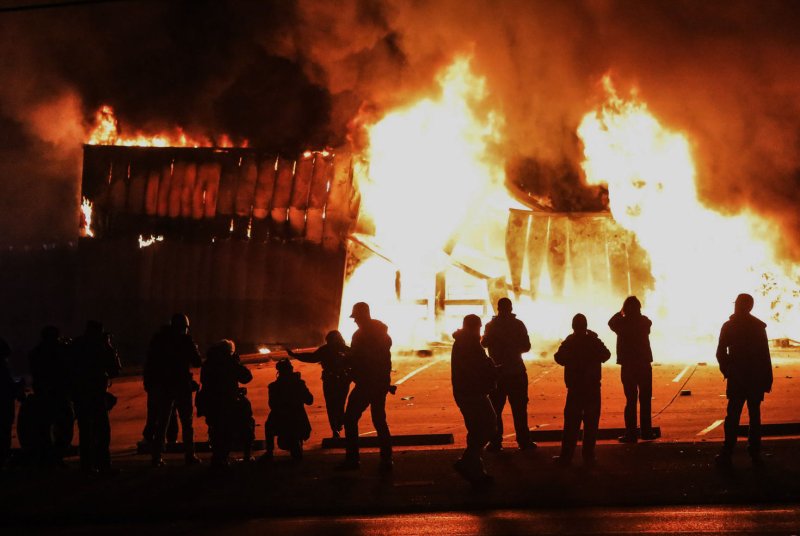The downtown section of Ferguson, Missouri, burns during the night of Nov. 24-25 after a grand jury decided not to indict police officer Darren Wilson in the killing of Michael Brown. File Photo by Lawrence Bryant/UPI |
License Photo
WASHINGTON, March 4 (UPI) -- The Justice Department said it will not pursue civil rights charges against Ferguson, Mo., Police Officer Darren Wilson and outlined a systematic pattern of racial discrimination from Ferguson law enforcement and government officials.
In an 86-page report released Wednesday, the DOJ said Wilson's action "lacks prosecutive merit and should be closed." Wilson, who is white, shot and killed black teen Michael Brown in August, sparking a national outcry and a re-examination of law enforcement race relations.
"Not only do eyewitnesses and physical evidence corroborate Wilson's account, but there is no credible evidence to disprove Wilson's perception that Brown posed a threat to Wilson as Brown advanced toward him. Accordingly, seeking his indictment is not permitted by Department of Justice policy or the governing law."
According to the report, the result of a six-month DOJ investigation, there is not enough evidence to establish probable cause or reasonable doubt that Wilson violated the law when he shot Brown. Wilson has said he shot Brown in self-defense.
"Multiple credible witnesses corroborate virtually every material aspect of Wilson's account and are consistent with the physical evidence," the report states. "Even if the evidence established that Wilson's actions were unreasonable, the government would also have to prove that Wilson acted willfully, i.e. that he acted with a specific intent to violate the law.''
In a separate report, the DOJ found Ferguson police predominately stopped and arrested black people without probable cause. The department's focus on blacks accounted for 85 percent of vehicle stops, 90 percent of citations and 93 percent of arrests. Ferguson's population is 67 percent black.
DOJ investigators said city leaders mandated Ferguson law enforcement to focus on generating revenue for the city. Police routinely performed "suspicionless, legally unsupportable stops." People were routinely punished for talking back to officers, who used retaliatory and punitive force, the report said. From those subsequent arrests, the city generated large amounts of revenue.
"Even where FPD officers have legal grounds to stop or arrest, however, they frequently take actions that ratchet up tensions and needlessly escalate the situation to the point that they feel force is necessary," the report said.
The DOJ also released seven racist emails sent by police and court officers. Those include one from April 2011 that depicted President Barack Obama as a chimpanzee and another with a joke characterizing an abortion by an African-American woman as a crime reduction measure.
Attorney General Eric Holder addressed the reports Wednesday, saying he understood why some people may find it confusing that the department's findings differed so greatly from some eye-witness accounts of Brown's death.
He said the "source of the discrepancy" could be found in the investigation into the police department's practices.
"As detailed in our searing report -- also released by the Justice Department today -- this investigation found a community that was deeply polarized; a community where deep distrust and hostility often characterized interactions between police and area residents," he said.
"A community where local authorities consistently approached law enforcement not as a means for protecting public safety, but as a way to generate revenue. A community where both policing and municipal court practices were found to disproportionately harm African-American residents. A community where this harm frequently appears to stem, at least in part, from racial bias -- both implicit and explicit.
"And a community where all of these conditions, unlawful practices, and constitutional violations have not only severely undermined the public trust, eroded police legitimacy, and made local residents less safe -- but created an intensely charged atmosphere where people feel under assault and under siege by those charged to serve and protect them."















